More Chinese youths volunteering at temples as Buddhist culture gains popularity in China
Lianhe Zaobao journalist Daryl Lim dives into a new trend among Chinese youths: volunteering at Buddhist temples. This new wave of young volunteers do not have a religious purpose in helping at temples but are seeking a different way of life, or even an escape from the pains of the current social and economic realities.
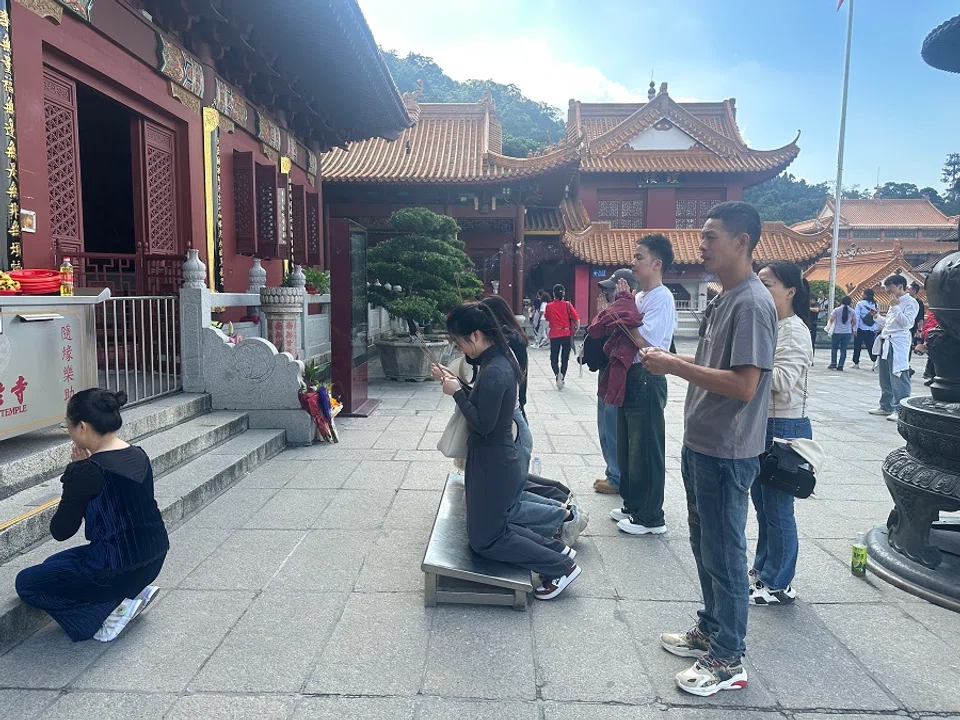
(Photos: Daryl Lim, unless otherwise stated.)
"I was cooped up at home for a long time after I resigned, and my thoughts were in a mess. I feel relaxed and at ease at the temple, so I became a resident volunteer here to experience a different life."
Thirty-one-year-old Liu was a deputy general manager of a social welfare enterprise in Shenzhen. Meeting a bottleneck in her career, she resigned in October this year without another job to find a new direction in life. She didn't spend much time job hunting after resigning, but instead became a volunteer for nearly two weeks at Hongyuansi (弘源寺) in Shenzhen, where she lived an "enriching yet relaxed life".
Temples flooded with youths
Liu told Lianhe Zaobao that she was initially "lying flat" (躺平) at home for a month after resigning from her job. While the work-related stress dissipated, she was feeling "increasingly depressed" and lost. That was when she came across Chinese youths sharing positive experiences of volunteering at temples on social media and decided to give it a go.
At the temple, Liu was assigned to help in the dining room with tasks including cleaning and chopping vegetables, preparing dumplings, washing dishes and tidying the place. As a single woman, Liu quipped, "I stayed with my parents and didn't do much housework at home. In the ten days I've been here, I've probably washed all the dishes that I haven't washed in decades."
Liu does manual labour for up to six hours a day, on top of the daily mandatory self-cultivation activities for her and the other volunteers, such as morning and evening classes, chanting scriptures and copying sutras.
Statistics from travel platform Ctrip showed that ticket sales for temple-related visits in China increased 310% year-on-year in early 2023, with nearly half of them coming from the post-90s and post-00s.
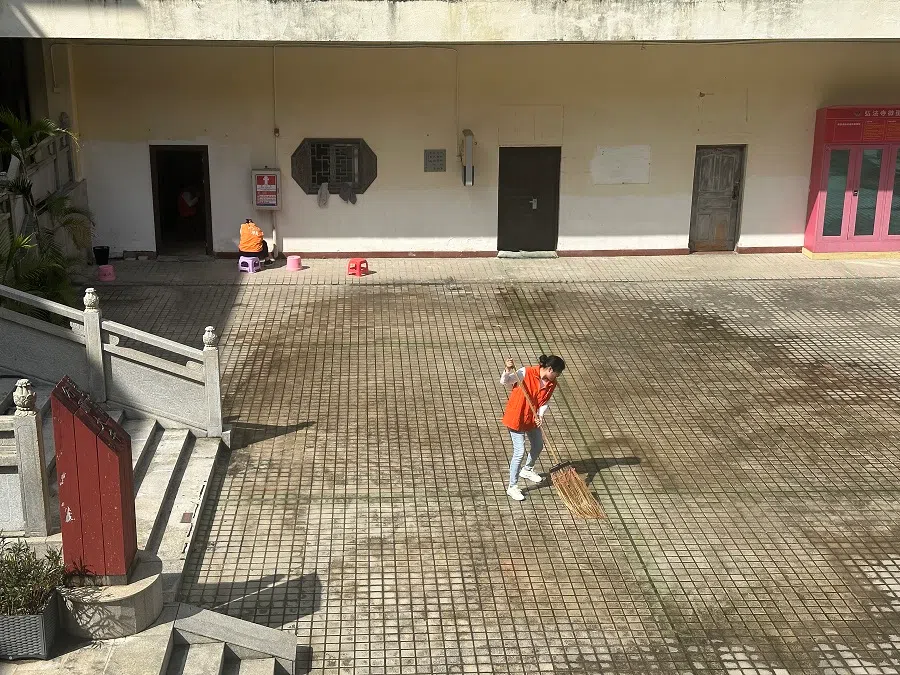
She said, "The disciplined lifestyle of a temple is pretty tough. We have to wake up at five-thirty every morning for morning classes and can only sleep at nine in the evening. Nonetheless, I feel productive and enriched every day. I'm not sure if it's all psychological - I'm not a Buddhist and I don't understand the scriptures - but after being here, I feel more positive and a little better overall."
Youths volunteering at temples is yet another extension of the rising popularity of Buddhist culture in China in the last five years. Amid the worsening "involution" in Chinese society, more youths are choosing "Buddha's ways" (佛系, learning to live life with Buddhist wisdom) when faced with the pressures of work and life, turning to a lifestyle of contentment regardless of the circumstances.
News of temples across China being "occupied" by youths have also emerged in recent years, with the online Chinese saying "not getting to work or getting ahead, Chinese youths prefer getting blessed at the temples" going viral. Statistics from travel platform Ctrip showed that ticket sales for temple-related visits in China increased 310% year-on-year in early 2023, with nearly half of them coming from the post-90s and post-00s.
When I visited two Buddhist temples in Shenzhen in mid-November, even on weekdays they were flooded with visitors - over half of them were youths. This is in stark contrast to the past, when temples were only crowded on the first and 15th days of the lunar calendar and important Buddhist festivals, highlighting that the people who visit temples were no longer just older believers.
... the temple volunteers are mostly youths; some would pass incense sticks to believers at the entrance of the temple, some would maintain order in the temple hall, while others would help clean the temple.
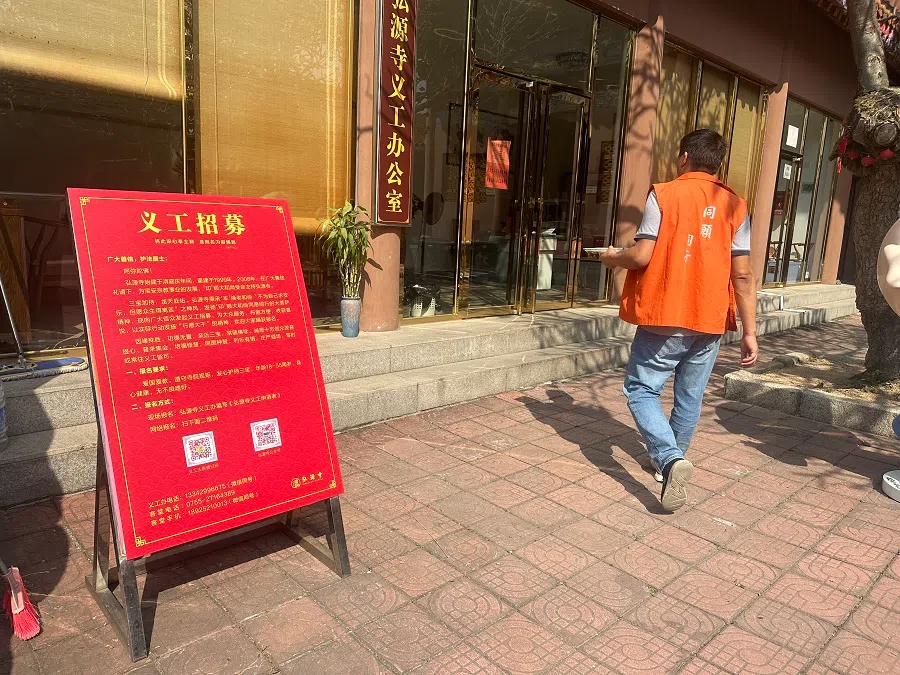
Also, the temple volunteers are mostly youths; some would pass incense sticks to believers at the entrance of the temple, some would maintain order in the temple hall, while others would help clean the temple.
Liu Xia, who has been a volunteer at Shenzhen's Hongfa Temple (弘法寺) for 20 years, observed that temple visitors have become younger after the pandemic. She said that apart from ordinary believers, more youths are becoming volunteers and actively participating in various temple activities such as Buddhist meditation and repentance rituals. Boasting 40 years of history, Hongfa Temple is Shenzhen's most popular temple.
So popular that it is hard to become a volunteer
Liao Zixi (pseudonym), a 23-year-old who volunteered for five days at Hongfa Temple in mid-November, told Lianhe Zaobao that she first wanted to volunteer at the temple a few months ago but could not book a slot because there were too many applicants and a limited number of beds at the temple. "There happened to be a vacancy during this period and I quickly applied online. So here I am," she said.
Many young temple visitors and volunteers said that they find it comforting to be away from the hustle and bustle of the city, and the temple's environment helps them find peace. Most of the interviewees expressed that they are not pious, but being in the temple makes them feel mentally at ease, and they hope to leverage a higher power to break free from the shackles of real life.
Liao, who remains unemployed, refers to her volunteer experience as a "gap week". She said, "The state of society nowadays is a little abnormal, and the involution culture is quite serious. Many systems are unfair. Coming to the temple as a volunteer is like a spiritual getaway, allowing us to face these issues from another angle."
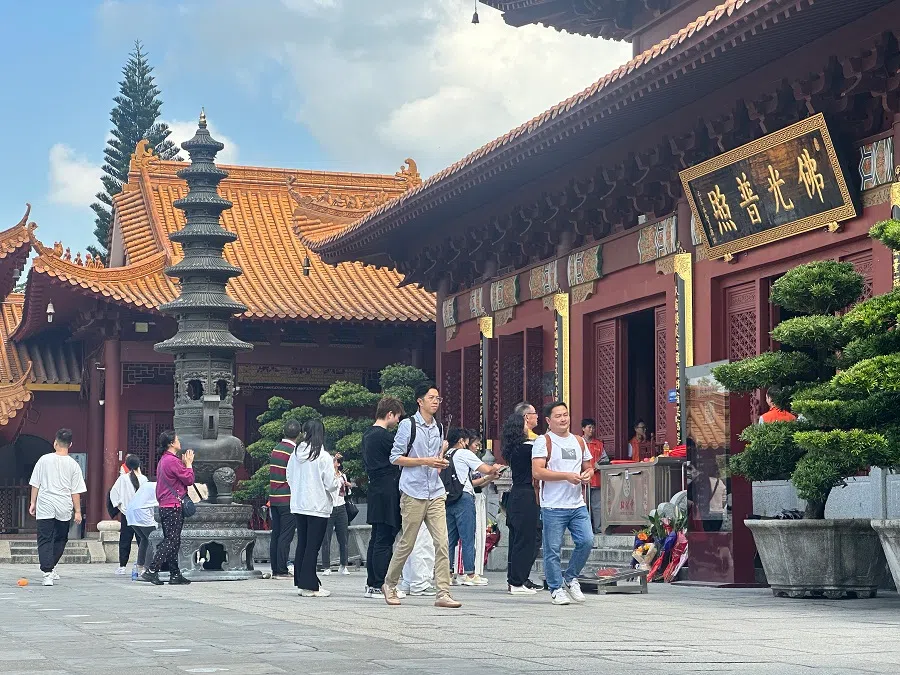
Huang Qiqi, a 25-year-old who just graduated from university in July, said during an interview that in the past four months, she had submitted more than 20 resumes, but to no avail. As it was nearing the end of the year, she had hoped to start a new job before the new year but was uncertain how to go about doing so. Hence, she decided to volunteer at the temple to cultivate her temperament.
She lamented, "The employment situation this year is too tough. If I claim that my only reason for volunteering at the temple is to experience life there, I would be lying to Buddha and the other bodhisattvas. People do not come to the temple without rhyme or reason. I certainly hope that by volunteering I can get something equal in return."
With the slowing of economic growth in China, the persistently high youth unemployment in the past year has been a focus. Official statistics showed that youth unemployment in the first half of the year has gradually gone up each month, and in June hit a record high of 21.3%. The government then announced that from August onwards it would suspend the release of new data to "optimise" data collection work.
Some analyses pointed out that the phenomenon of youths "praying to deities and the Buddha" is a reflection of their sense of anxiety and helplessness, while volunteering at the temple is a form of self-care and a short escape as they face the problems of their reality.
The 31-year-old Liu said, "Indeed, choosing to come to the temple was initially a form of escapism. But then I thought, I have nothing to do at home, so I might as well do something meaningful."
Rise of Buddhist culture
Wei Zhizhong, chief psychological counsellor at Guangzhou's Yiweiduxin Psychology Counselling Clinic (一苇渡心心理咨询), opined in an interview that the phenomenon of youths becoming volunteers at temples is a show of "benevolent love"; by volunteering, they hope to proactively find a way to achieve breakthroughs in life challenges.
"When people feel ungrounded and lost, Buddhist culture can have an ameliorating effect, teaching us how to let go and feel free." - Wei Zhizhong, Chief Psychological Counsellor, Guangzhou's Yiweiduxin Psychology Counselling Clinic
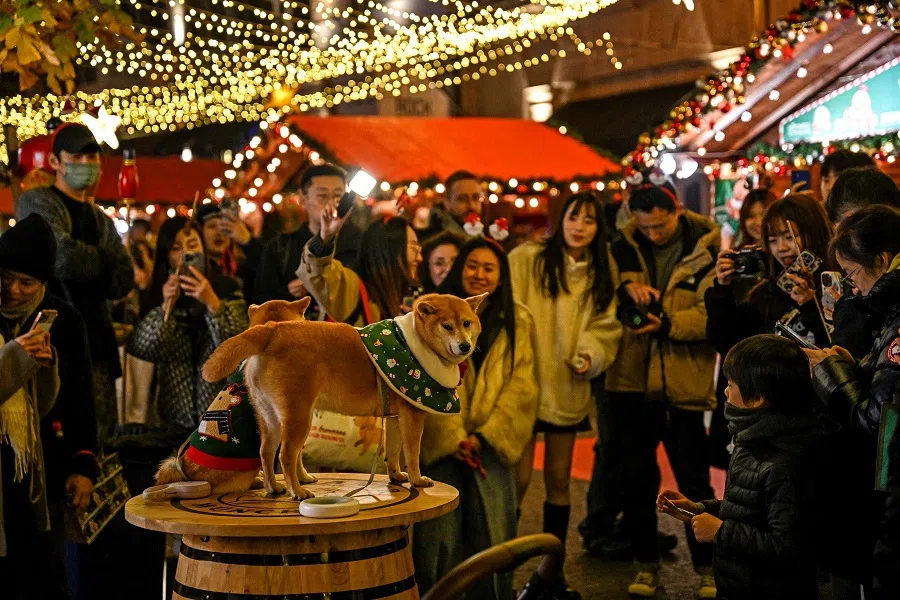
He pointed out that when youths are at a critical juncture in their lives, they often need a lifestyle change to help them overcome their sense of helplessness. As a place for spiritual growth and self-cultivation, temples serve as a safety harbour.
Wei added, "Many young people are not Buddhists and did not get in touch with Buddhism because of religious beliefs. They are influenced by the culture of benevolence in Buddhism and hope to grow through the practice of self-cultivation and balancing their minds, to help others while also finding a path for their own futures."
He felt that the elevated interest in Buddhist culture among the youth in recent years is a reflection of the flexibility and versatility of China's traditional culture, which is a blend of Confucianism, Buddhism and Taoism.
He explained that with China experiencing rapid societal and economic growth over the past few decades, Confucian culture has naturally been prevalent, encouraging people to work hard and contribute to society. But with China set to shift towards high-quality development, society would inevitably experience some difficulties in the process.
He added, "When people feel ungrounded and lost, Buddhist culture can have an ameliorating effect, teaching us how to let go and feel free."
Liao Zixi told me, "You still have to rely on yourself."
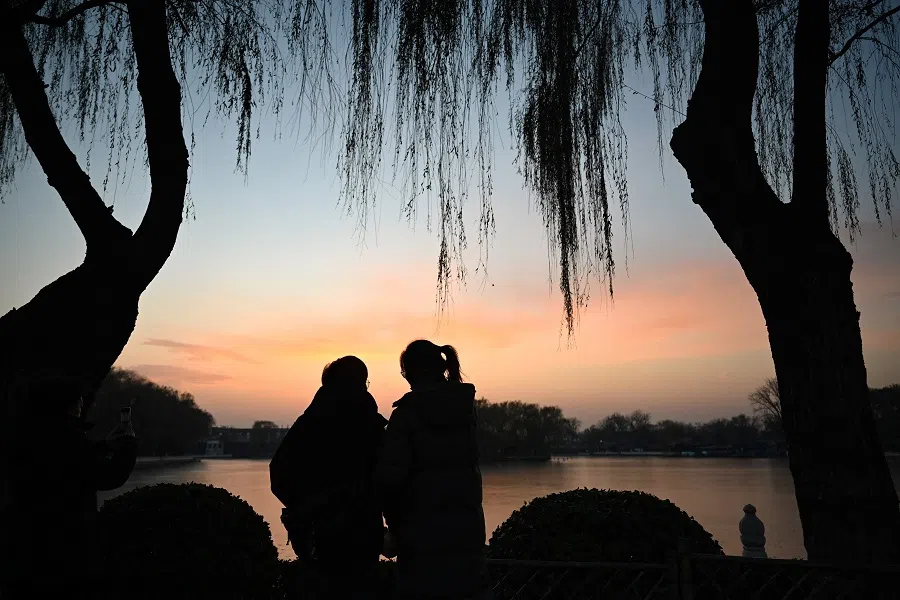
After their volunteer service, the youths would still have to leave the temple and return to society. The short experience can offer them temporary relief from the troubles of their lives, but their problems would not disappear.
But for some interviewees, their time staying at the temples have given them a clearer answer.
Liao Zixi told me, "You still have to rely on yourself."
This article was first published in Lianhe Zaobao as "中国年轻人涌入寺庙做义工 从不如意现实生活中求解脱".

![[Big read] Paying for pleasure: Chinese women indulge in handsome male hosts](https://cassette.sphdigital.com.sg/image/thinkchina/c2cf352c4d2ed7e9531e3525a2bd965a52dc4e85ccc026bc16515baab02389ab)

![[Big read] How UOB’s Wee Ee Cheong masters the long game](https://cassette.sphdigital.com.sg/image/thinkchina/1da0b19a41e4358790304b9f3e83f9596de84096a490ca05b36f58134ae9e8f1)

